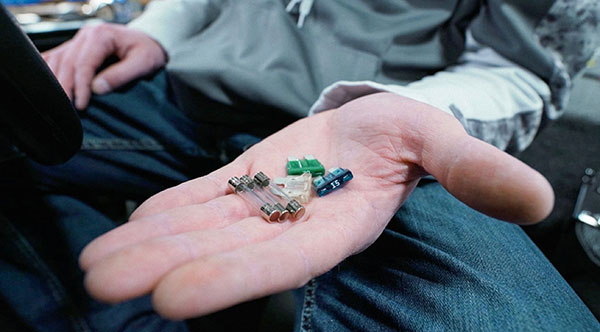Mercury Report
 Boat Fuses
Boat Fuses
From yachts to dinghies, practically every vessel this side of a canoe has an electrical system, and that electrical system is bound to have at least a few fuses in it to protect it.
To avoid losing functionality, especially when you’re on the water, it is critical that you know where all the fuses are located, how to change them, and that you have the appropriate spares onboard.
Why is this so important? Well, first you need to understand what a fuse does. An electrical fuse is, in essence, a removable section of an electrical circuit that is designed to sacrifice itself in the event of a power surge, a short or other electrical mishap. Fuses are amp-rated so that the fuse will fail – that is, burn out and stop the flow of electricity – before the wires and equipment it’s protecting are damaged. Fuses also help prevent electrical fires. Consequently, fuses are important because they keep your engine, wires, gauges, electronics and the like from being damaged when something goes wrong in the electrical system. It’s much easier and cheaper to swap out failed fuse than it is to replace an expensive piece of hardware.
To make sure you’re prepared for any eventuality, whether you’re docked or on the water, you need to determine the entire range of fuses your boat requires, as well as have a comprehensive set of spares on your boat. The best way to determine which fuses your boat requires is to consult your owner’s manuals. You’ll want to take a comprehensive inventory of all the fuses your boat requires, from the engine to the various aftermarket components onboard, such as the trolling motor, chart plotter, fish finder, etc. When creating your inventory, be mindful that fuses come in an array of types and amperage. You’ll want to make sure you record all these details. If you’re not sure which fuses your boat requires, make an appointment with your local Mercury Marine authorized dealer so the professionals there can help you figure out exactly what you need.
Depending on your level of expertise and comfort, you may want to add a basic 12-volt electrical repair kit to your cache of spare fuses. A wire cutter/splicer, a small spool of wire and few basic connectors can be invaluable in the right hands, should the need arise.
Your boat may also have a few resettable breakers that work similarly to the ones in your home. The advantage of a breaker is that they are designed to be reset instead of replaced. If your boat does have breakers, make sure you know exactly where they are located.
Finally, a few basic safety tips:
- Never bypass a blown fuse with wire, foil or anything else, and only replace with a fuse of the same type and amp rating. Using a different type of fuse can cause serious damage to your electrical system and components.
- When changing out or checking a fuse, take care that you don’t short out the circuit with a metal tool such as a screwdriver.
- If you keep blowing fuses – especially in the same circuit – take your boat to your dealer. This can be a sign of a chafed wire or another issue that should be handled by a trained technician.
Remember, having a basic understanding of your boat’s electrical systems and the fuses required can prove invaluable should you lose functionality out on the water. And having this knowledge, as well as a comprehensive set of backup fuses, will enable to head out with confidence and peace of mind.




